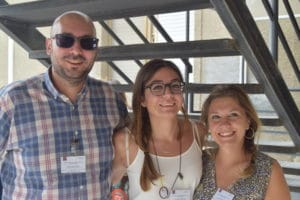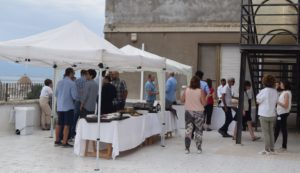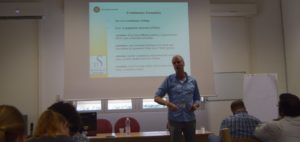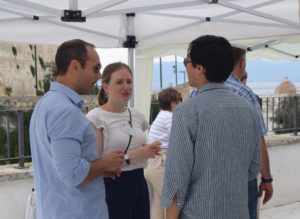Stefania Fiorentino, Tasos Kitsos and Silvia Rocchetta, students at the first RSA summer college 2018 (#rsasummercollege2018) provide their views and experience of the event.

Five days of learning, exchanging ideas and networking at the wonderful environment of the University of Cagliari under the auspices of the Regional Studies Association. Do sign-up for it next year! These two sentences sum up the way we feel about the summer college we’ve just been part of.
The college started off with a carefully thought-out gathering on the arrival day evening. With a backdrop of stunning views, students and instructors came together to get to know one another before the classes started. This helped most of us avoid the awkward “first day at school” feeling.

The first day of classes was an intense day which started with introductions, and continued with very interesting presentations on the theory and empirics of Evolutionary Economic Geography (Ron Boschma, Dieter Kogler), the importance and practicalities of evaluating policy impacts (Riccardo Crescenzi) and the resilience aspects and challenges in Italian peripheral areas (Alessandra Faggian). Following these presentations and interesting discussions were the poster presentation sessions where the students had the opportunity to sit with instructors and fellows and discuss their projects. A lot of very interesting projects were presented, covering a large extent of regional studies and geographical space. The day ended with the most colossal dinner (thanks!) ever, showcasing the best Sardinian food from the sea and the mountains.

Despite the culinary effort made the night before, we all woke up very enthusiastic about a second full day of presentations. This time we started with a planning point of view on sustainable development indicators at the global scale (Enda Murphy), followed by a perceptive talk (Elisa Giuliani) on inequalities and contemporary capitalism issues, and examples of bad regional development that, hopefully, as the next generation of experts we will not replicate. We were then divided into groups for a session on how to advance and develop our careers according to our current stage.
The afternoon continued with two parallel sessions on methods. The qualitative track showcased social network analysis and mixed method approaches (Elisa Giuliani, Michael Muthukrishna), while the quantitative one touched upon the basic principles behind GIS and spatial econometrics (EndaMurphy, Peter Kedron and Emanuela Marrocu). Then the discussion continued with a talk on planning in action (Alessandro Plaisant), and a critical debate on traditional econometrics methods questioning the implications for research reproducibility (Peter Kedron). The day ended as usual with social activities, including Sardinian delights and the famous local Mirto.
An exciting day three started with an alternative insight on matters of regional development and transforming academic research to policy recommendations by Lewis Dijkstra from the EU Commission. Lewis’ interesting anecdotes were followed by a mind tingling presentation by Michael Muthukrishna showing experimental approaches on the relationship between cooperation and corruption.
The afternoon revealed a great surprise: being on an island, we fulfilled our ‘obligation’ to take the matters to the beach. We had our “school bus” excursion to the wonderful Su Giudeu beach in Chia: a swimming networking/relaxing session to cool down our overworked brains, followed by a Sardinian sized pizza (which means huge).
Dieter Kogler kicked off the last day by challenging the audience to discuss whether we were exploring the most appropriate research questions to design more sustainable and inclusive developments. This challenge gave rise to a vivid and thorough debate amongst all the participants. In particular, several researchers pointed out the key role of journals in indicating the upcoming topics to be investigated. In keeping with this direction, Prof. Bailey, Editor in Chief of Regional Studies, encouraged young researchers to embrace interdisciplinary approaches to push the literature towards new frontiers. He also gave very useful suggestions and tips on publication and user engagement strategies.

To sum up: for us trailblazers, these five days were so enriching that they will be unforgettable. The warm Sardinian sunshine and the island’s welcome environment complemented perfectly the effort and hard work of the organisers (RSA – Sally Hardy, Klara Sobekova; LOC – Michela Cordeddu, Emanuela Marrocu and Stefano Usai) to make the whole experience extraordinary. The always smiling Massimo and his daily fights with the coffee machine will also be hard to forget. During these days, we learnt that cross-fertilization of ideas and multidisciplinarity are fundamental ingredients to push regional research towards new frontiers and improve the world we live in. Sharing ideas and opinions with both instructors and participants was a unique experience and we wish all of them the very best in their future endeavours.
Should you get the opportunity to go, do sign-up for this summer college and be prepared for a great time.
Stefania, Tasos, Silvia